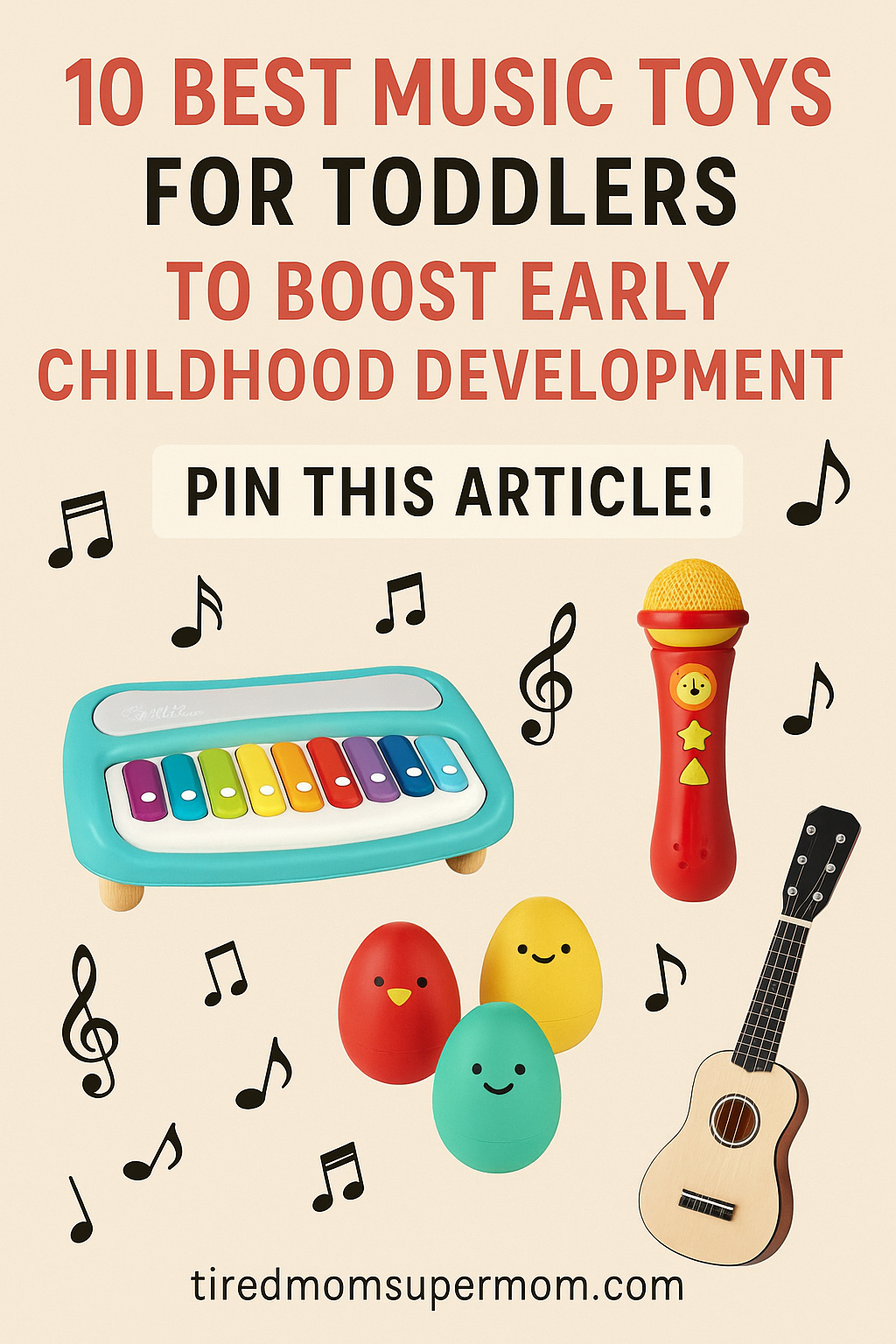10 Best Music Toys for Toddlers to Boost Early Childhood Development
Looking for ways to boost your toddler’s brain development, coordination, and creativity?
Music toys for toddlers are more than just fun — they support cognitive growth, emotional regulation, fine motor skills, and language learning.
In this guide, you’ll find the 10 best music toys for toddlers, plus tips for choosing the right toy and answers to common questions parents ask.
Heads up: This post may include affiliate links. As an Amazon Associate, I earn from qualifying purchases—at no extra cost to you. Full privacy policy and disclosure here.
Why Music Toys for Toddlers Are Essential
Music toys aren’t just entertaining — they’re developmental powerhouses. Early exposure to rhythm, sound, and movement helps toddlers:
- Develop fine and gross motor skills
- Improve memory and listening
- Strengthen emotional expression
- Encourage social bonding through musical play
According to the Harvard Center on the Developing Child, early stimulation through music helps build stronger brain connections during critical growth windows.
What to Look For in Music Toys for Toddlers
Before we jump into the top picks, here are key features to keep in mind:
- Safety First: Look for BPA-free, non-toxic, age-appropriate materials.
- Simple Controls: Toddlers thrive with large buttons, knobs, and instruments that are intuitive to explore.
- Multi-Sensory Appeal: Lights, textures, and varying sound patterns enhance learning.
- Durability: Toddlers test everything with drops and throws — opt for sturdy builds!
10 Best Music Toys for Toddlers (With Affiliate Links)
Here are the most parent-approved, developmentally beneficial music toys for toddlers available now:
1. 🎹 Baby Einstein Magic Touch Piano
- Why It’s Great: This wooden piano uses “magic touch” technology to play sounds with the tap of a finger.
- Benefits: Teaches notes and melodies without needing batteries or screens.
- Perfect For: Ages 12+ months, especially kids curious about real instruments.
2. 🥁 Fisher-Price Laugh & Learn Silly Sounds Drum
- Why It’s Great: Responds with lights, songs, and fun animal sounds.
- Benefits: Promotes cause-and-effect understanding and gross motor play.
- Also Try: Using it alongside your favorite toddler playlist like these happy summer songs for children.
3. 🎺 Stoie’s Wooden Musical Instrument Set (19 pcs)
- Why It’s Great: Includes tambourines, maracas, castanets, and more in a compact storage bag.
- Benefits: Supports rhythm recognition, sharing, and group play.
- Bonus Tip: Great for mini jam sessions during family karaoke nights.
4. 🧸 LeapFrog Learn & Groove Musical Table
- Why It’s Great: Combines music with early literacy and numeracy through interactive play.
- Benefits: Encourages standing and cruising, making it ideal for new walkers.
- Ages: 6 to 36 months.
5. 🪘 Melissa & Doug Band-in-a-Box Clap! Clang! Tap!
- Why It’s Great: Classic wooden construction and real musical sounds.
- Benefits: Teaches rhythm, teamwork, and timing.
- Why Parents Love It: No batteries required and screen-free!
6. 🎤 VTech Zoo Jamz Microphone
- Why It’s Great: Light-up microphone with voice-changing effects and sing-along fun.
- Benefits: Boosts confidence and encourages speech development.
- Activity Idea: Pair with the best kids party songs for a dance break.
7. 🥁 Hape Pound & Tap Bench with Xylophone
- Why It’s Great: Combines cause-and-effect hammer play with music-making.
- Benefits: Great for hand-eye coordination and sensory processing.
- Use It With: Classic songs for boys.
8. 🎼 Skip Hop Egg Shaker Trio
- Why It’s Great: Each egg features a different sound and texture.
- Benefits: Easy to grip, perfect for developing fine motor skills.
- Best For: Babies and early toddlers learning rhythm.
9. 🎷 VTech KidiBeats Drum Set
- Why It’s Great: Features four drum pads and interactive learning modes.
- Benefits: Helps toddlers match rhythm with lights and beats.
- Bonus: Great pre-instrument training for future musicians.
10. 🎸 Loog Mini Acoustic Guitar for Toddlers
- Why It’s Great: A real guitar designed for tiny hands.
- Benefits: Sparks early interest in learning instruments.
- Pair With: These easy guitar songs for kids to keep their musical journey going!
Music Toys and Toddler Milestones: A Helpful Guide
Music toys for toddlers offer more than entertainment. Here’s how they support different stages of development:
| Age | Skill Focus | Toy Type |
|---|---|---|
| 6–12 mo | Sound awareness, cause/effect | Light-up pianos, drums |
| 12–18 mo | Movement, rhythm, social play | Shakers, dance mats |
| 18–24 mo | Language, imitation, coordination | Toy microphones, xylos |
| 2–3 yrs | Pretend play, memory, rhythm | Drum sets, guitars |
Related Musical Resources for Parents
Explore these helpful posts to enhance your toddler’s musical world:
🎵 FAQ: Music Toys for Toddlers
What age is best to introduce music toys?
You can start as early as 6 months with safe, soft musical toys. Most toddlers benefit most between 12 and 36 months when motor skills and cognitive development are accelerating.
Are electronic music toys better than traditional ones?
Not necessarily. While electronic toys add variety, traditional instruments like shakers and drums encourage active play and sensory exploration.
Can music toys improve language skills?
Yes! Repetitive songs, singing, and even toy microphones encourage toddlers to mimic sounds and expand vocabulary.
How many music toys should a toddler have?
A small rotation of 3–5 music toys is ideal to keep them engaged without overwhelm.
What’s the best first music toy?
Start with simple shakers or a soft piano like the Baby Einstein Magic Touch. They’re easy to use and introduce basic cause-effect relationships.
🎯 Final Thoughts
Music toys for toddlers are powerful tools for growth — emotionally, physically, and cognitively. They provide open-ended, joyful play that teaches kids how to listen, express, and connect.
Which of these music toys has your toddler tried?
Leave a comment and share your experience!
✨ Pin this post for later!

